#clancy gilroy

My baby

would you be in his webcast??

“The Midnight Gospel: Unfinished Drunk Clancy” … Here a few months old drawing of Clancy drunk that will never be finish and never will. ( PLEASE DON’T REPOST OR TRACE IT, THANK YOU)

“Adventure Time x The Midnight Gospel: Chilling” … I saw this abandoned on my phone and never post it, it is Finn and Clancy, Finn playing something on the Nintendo switch (forgive me it looks bad) and Clancy smoking sitting on top of the wall I guess I don’t know. This was also a high school AU thing I was doing. (PLEASE DON’T REPOST PR TRACE IT, THANK YOU)


“The Midnight Gospel: Old fem Clancy drawings” … Found more old drawings of Clancy as a woman. I really need to stop forgetting to post I’ve drawn stuff. (PLEASE DON’T REPOST OR TRACE IT, THANK YOU)

Clancy dress up

Watched all series at ones. woah! Hope there will be some more.
This is my watercolors try on drawing Clancy and Charlotte.
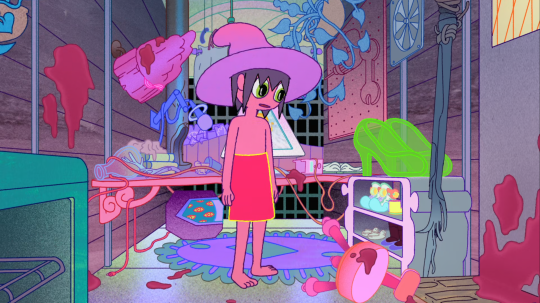
I have another meta-analysis before getting into the plot content of The Midnight Gospel episodes. This time, I’m exploring the recurring motif of Clancy’s taking a pair of shoes with him as souvenirs of his trips to the virtual multiverse, again, highlighting as I did in my previous post that the planets and people he visits are indeed virtual.
But before getting into the shoes at the end of each episode, it is relevant to discuss how each episode begins. Clancy orders Computer, his home A.I., to bring up worlds for him to visit. After which, Clancy gets to choose from a series of custom avatars what he wants to look like for his trip.
The act of shopping for universes and customising exactly how you appear to the world is the epitome of convenience. Clancy isn’t just realising he can buy a product on the Internet instead of going to a store, he’s acquiring a planet and all its natural and artificial riches.
This isn’t a stretch either. Later on in the series, we meet a family of Multiverse Simulator farmers, who mine each world for its expensive artefacts and sell them for money in the tangible reality where the show takes place.
On top of that, each episode has a familiar flow, with Clancy entering the world, conducting his interview, and the world coming to its apocalyptic end, with Clancy hilariously getting caught up in the middle of things. Despite this, Clancy is in no real danger, because at any time he can summon Computer to take him back outside the simulator. Moreover, his body is safely in his home the entire time.
Then Clancy simply proceeds with the rest of his life. He uploads the space-cast and lets the view (yes, singular) roll in.
“Computer, do it NOW”
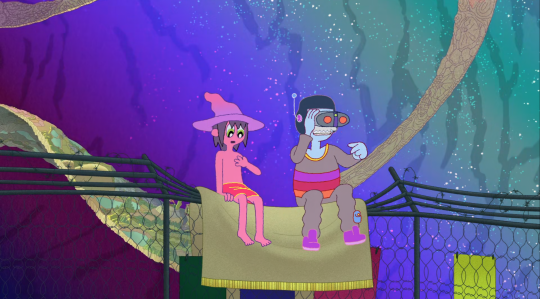
What’s striking is how transactional Clancy’s relationships with those around him are for majority of the show. He listens to his interviewees and offers them a modicum of respect, but that’s also because for the most part he finds himself agreeing with what they’re saying. The times he doesn’t like what he’s hearing, such as with David, there’s so much resistance, so much tuning out. It’s only David’s patience and gentle prodding that Clancy opens up enough to listen to what he has to say and calm down.
Two things to note on that. First, David is under no obligation to teach Clancy anything. He doesn’t have to put up with an angry octopus who just ruined his painting, came into his place, and started screaming at him. It just so happens that his personal philosophy makes it less likely for occurrences like that to faze him. Second, Clancy wasn’t planning on doing an interview with David. There’s a chance he wasn’t planning to do an interview at all. He was trying to get into the simulator to escape a call he did not want to hear.
Computer calls him out on it as well, saying,
It’s become clear to me that you’ve been avoiding dealing with the real world by going into my many universes.
All the while Clancy is talking over him with the same dismissive attitude, tuning out what advice Computer is giving, just like the phone call or voice messages he’s been avoiding.
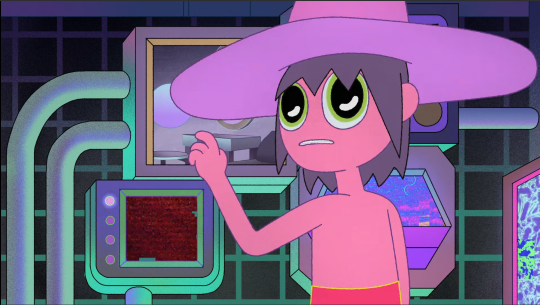
Though we don’t know what Clancy’s life was before the events of the first episode, we do know that since then, he’s been living in a way that suited him. Doing the things he more or less enjoyed. Despite this, he still had responsibilities and generally, just things he didn’t want to do. The most evident in the episode was his severe neglect of Computer, causing the malfunctions that threw him into a fit of rage in the first place.
It’s in this episode that he finally interacts with people outside the simulator. We are introduced to his neighbours, the aforementioned simulator farmers, We meet Bryce, the fidgety Multiverse Simulator repairman. And his interactions with them are transactional. He calls on them because he needs something– a way to fix his simulator. He humours them because he thinks they can offer him what he wants, and when they didn’t, he left them immediately.
In my first post of The Midnight Gospel analysis playlist, I talked about how it was so easy to respond to your own need to be comfortable and satisfied because your needs are immediate and urgent to you. You feel them and when you don’t answer them they gnaw at you and caw at the back of your mind until you satiate them.
I want to emphasise that the harm is not that we are born self-centred. No, that’s a fact of life. We need to take care of ourselves as individuals before we can function in the world we live in. It’s a survival instinct. It becomes problematic when self-preservation and self-comfort are where we stop.
It’seasy to focus on yourself and only yourself, forever. It’s convenient. On top of that, it’s enabled by all our new technology. In the show, it’s having a semi-sentient home A.I. and a multiverse simulator to escape to and profit from.
There are a lot of parallels to this in our world. Digital spaces, personalised content, economic privilege. In these cases, you can just stay in your comfy warm bubble and never leave it.
The Extreme Comfort Zone

Some concrete examples involve the consumption of media. I don’t want to sound like a crotchety old person and I’m not disparaging anyone. Something I’ve noticed, though, is how my younger family members only watch video streaming sites. Exclusively they watch content that caters to their very niche interests. This stands in stark contrast to when cable television monopolised home entertainment, because you couldn’t decide which shows would air and you couldn’t decide when they would air. You’d have to make an effort to make time for the series you wanted to watch, and in the act of waiting around for a show you were interested in, you’d stumble upon other channels, movies, or series that were interesting.
This is not to say that the democratisation of entertainment is a bad thing. I’m glad that people now have a greater say in the content they consume, they way my younger self did not, and I’m glad people have more spaces to share their niche interests in a way my younger alienated self could only have dreamed. However, this setup brings to the forefront our very transactional relationship with not only mainstream media but individual and independent content creators.
Watching movies is another example. In a theatre, you either sit through an entire movie or you walk out if it’s too unbearable. If a scene is too tense or suspenseful, you have no way of knowing whether or not you’re close to the end or if there will even be a happy resolution.
A habit I’ve noticed with family and friends, especially the younger ones, easily lets me know when they’re bored or uncomfortable. When we’re watching a video or streaming a movie, they’ll tap on the screen to see how much time is left in the running.
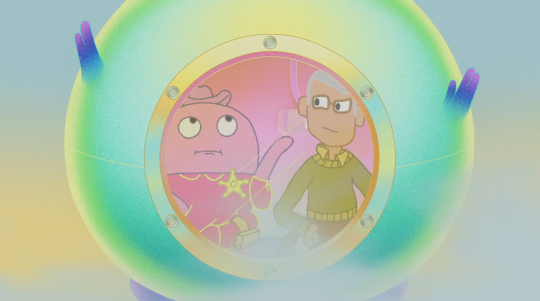
And there’s an underlying message to that. If what we’re seeing or hearing isn’t something tailored to our specific interests, then it’s not worth consuming. If it’s too long, then I didn’t read it. If the art is kind of weird, then it’s not enough to keep watching, no matter the message. (This is real. I know people who tell me they refuse to watch a show like Adventure Time or BoJack Horseman or anyanime because they don’t like the art).
It’s perfectly within one’s rights to skip to end of a book or a film. Life is short. We’re always busy. The modern world has a lot of demands and sometimes you just want to turn off your brain and enjoy something.
But on the rare days you have free time and energy to spare, you can venture outside the realm of what is reassuring and self-affirming. Yes, you can stay in the extreme comfort zone because you don’t have to leave it. You don’t haveto face other people or be confronted by things that make you second-guess your entire way of thinking. But I think you should. Not every moment of every day, because that gets tiring. But once in a while, definitely.
Now how does this all tie back to The Midnight Gospel?
Walking in Virtual Shoes
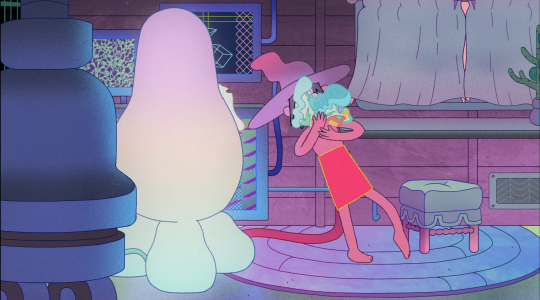
When we get deeper into his backstory, we find out that Clancy has been running away. He’s been refusing to face the relationships confronting him. Like his sister. Talking to her on the phone, she tells him he can’t just keep starting over without facing himself, and it leads him to an angry meltdown in the David episode.
If our worldviews are never challenged, if we are always in our comfort zone, then we never have a reason to turn outward. Because the default setting is to focus on ourselves.
But Clancy does encounter people who regularly challenge his worldview. Even if they’re created by a computer program. And he listens to them. Some more easily than others, but in every episode, eventually, he listens. And they, in turn, affect his emotions and changes the decisions he makes in life.
Again, this is nothing against the younger generations or against current technology. Because I think every generation is guilty of this: Retreating into a comfortable worldview where we don’t realise what other people go through, or don’t think that other people are capable of understanding us. It’s incredibly isolating. In the end, it leads to so much frustration and dissatisfaction, that when our bubble is even slightly threatened, we’re sent into an angry meltdown much like Clancy was.
So, I think it’s very poignant that at the end of every episode, Clancy always manages to take a shoe or two back with him, and these are what he keeps as souvenirs of his trip. This recurring image is significant.
There’s that idiom about walking a mile in someone else’s shoes. Though I think it relates to The Midnight Gospel tangentially, I don’t think it’s exactly what the metaphor of the shoe in each episode means. Clancy doesn’t always take the shoes from the interviewee of the episode. Sometimes it’s just a random shoe he finds on the ground. Sometimes, he takes it from another character. In the last episode, the shoes were pretty much handed to him.

Therefore, I wouldn’t say that Clancy is walking a mile in someone else’s shoes. In fact, in every episode, Clancy remains distinctly Clancy. Each of his avatars have his same color scheme, his eyes, and even his signature hat. During the interviews, he interjects with his own opinions and experiences.
That’s the essence of active engagement with the world, including other people and the media we consume. We listen and then measure it against our own beliefs and values. We re-examine ourselves but that entails having a self to re-examine in the first place.
The shoes represent stepping, quite literally, outside your comfort zone. Even when we’re sitting at home or comfortably, we’ll probably be wearing clothes. But we don’t need to wear shoes if we don’t have to.
The meta is supported by Clancy’s character always presented as being barefoot. In his current lifestyle, he doesn’t need to interact with anyone else. He doesn’t need to do most things he doesn’t want to. He doesn’t need to challenge himself. But in the end, he chooses to, whether he realises or not. Just being open to what the world has to say, especially the people in it, is enough of a first step.
So, to me, the shoes represent having to make that conscious effort of having to put on shoes and go outside. It’s a decision to engage instead of disengaging and curling up inside yourself. You can’t just be thrust into that, or accidentally end up with shoes on and find yourself outside.
——————————————————————————————-
If you enjoyed this post, you might enjoy my other analyses in The Midnight Gospel playlist:
- Some Thoughts: The Midnight Gospel Trailer
- The Midnight Gospel Analysis 01: What’s real and does it matter?
I’ll continue to link to future Midnight Gospel analyses as they come. And as always, my ask box is open.
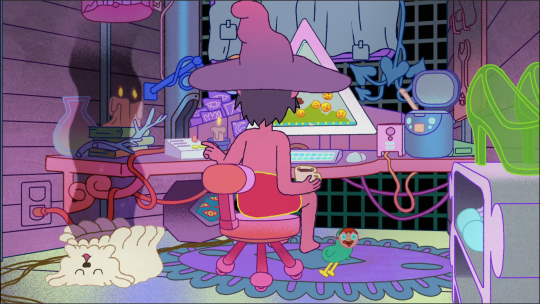
Going to kick off the revamping of this blog with a deeper look into one of the premises of The Midnight Gospel. A long time ago, I gave some thoughts on the trailer for the show in anticipation of its release. I must say that it did not disappoint and I’ve found myself thinking back on the show quite often since finishing it and rewatching a few episodes here and there.
However tempting it is to get into some of the show’s core messages about spirituality, faith, and generally how to live life, I want to start with an analysis of one premise of the show that’s easy to take for granted. I think that it’s a great way to frame how my analyses will be presented moving forward as well.
I’m talking about the Multiverse Simulator. More specifically, I’ll be discussing the relevance of introducing infinite worlds and their interesting inhabitants, but underscoring that they aren’t real in the literal sense of the word.
Overview of The Midnight Gospel
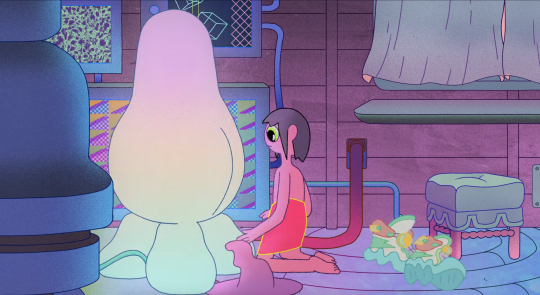
For those unfamiliar with The Midnight Gospel, it’s a show about a space-caster (imagine a video podcast broadcast to all of space) Clancy Gilroy, who interviews different people on life, death, and everything that comes in between. Here’s the catch, though, Clancy’s interviewees are all the product of a simulation. He visits different universes through his Multiverse Simulator, a device that randomly generates worlds and their inhabitants.
Every episode is a different interview, whose content is based on actual interviews by co-creator of the show, Duncan Trussell, for his own podcast. Taking place within the backdrop of a colourful and sometimes absurd world, courtesy of co-creator Pendleton Ward, creator of Adventure Time.
The show goes to some very profound places and at times explores heavy topics. But there are fart jokes at just the right times, and that balance is what makes the show so heartwarming and enjoyable.
With such an episodic premise, The Midnight Gospel may seem very much like a standard interview-type podcast but animated, but this isn’t the case. As the show progresses, we are introduced to more of Clancy’s life outside of his space-casting. His character develops and changes along the way. And that growth can, in large part, be attributed to the conversations he has with the inhabitants of other worlds.
But when circling back to the core of the show, one looming issue emerges. If these interviewees are just the product of some computer algorithms, which, at one point, were programmed by a person, what value do these conversations have? The show does not shy away from reminding us that the Multiverse Simulator is a machine. In fact, the plot of later episodes is driven by technical issues faced by owning a machine that can malfunction. So if none of these interviewees are real, what of their thoughts, words, and actions? Is Clancy, in fact, alone?
Fictional Worlds, Fictional People
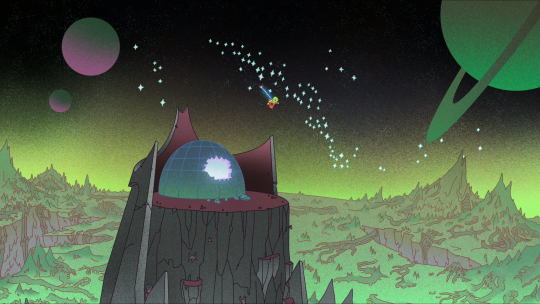
The series does begin with Clancy living alone. Aside from his simulations, his pet dog, Charlotte, and his semi-autonomous home A.I., Computer, Clancy doesn’t interact with anyone else. It’s only towards the end of the series that we see other humans and even then, Clancy carries on a transactional relationship with them, calling on them or interacting with them because he needs something from them.
He also goes out of his way to shut out other people– and without spoiling too much of the upcoming analyses– even those close to him. This behavior stands in contrast to how he interacts with the simulations, where he actively listens to and engages with his interviewees.
On some level, he might just be doing what a good interviewer does to mine for content. However, the conversations he has with them directly affect his feelings, thoughts, and actions, granted some more easily than others. Nonetheless, they change his way of living and his worldview.
If we look at the Multiverse Simulator as an allegory for fiction, then the relationship Clancy has with his interviews makes a lot of sense. Fiction, like the code behind the simulated worlds, is created from human hands. An algorithm that learns how to talk like a human, even experience like a human, must be fed human experiences and realities in the first place.
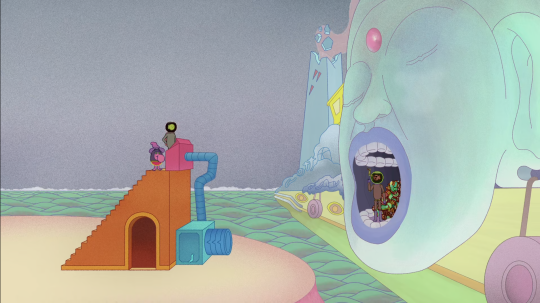
Through fiction, we are exposed to other people’s feelings, thoughts, and experiences, and like any kind of media, we can choose whether or not we want to consume them, engage with them, or internalise them.
However, it might be easier hearing these lived truths coming from a fictional character than from someone we have biases against believing (case in point, how many people dismiss parental truths as paranoia?). In fiction, we’re communicated these truths in a vicarious and visceral way. Show, don’t tell. This makes it all the more impactful.
And what is a Multiverse Simulator but the latest form of cutting-edge entertainment? A new kind of consumable media?
The Multiverse Simulator is an excellent allegory for fiction as well, because sometimes, fiction exaggerates the reality being presented. It blows up and stretches truths in fantastical, terrifying, and sometimes unexpected ways. Nonetheless, we recognise the humanity (or lack thereof) in the characters and in the story.
Furthering the allegory, we see that the multiverses are not separate from one another. There’s a cat ship in one episode that Clancy sets off course and as a result, Clancy is derailed en route to his destination planet in the next episode by colliding with the ship. Similarly, works of fiction inspire each other. Media that creators have consumed influences their work.

And whether or not we create more media, fiction inspires the consumer. At the end of every episode, Clancy edits his space-cast for upload. In this way, all the fiction we consume, whether a book, a show, a movie, or anything else, affects us differently and different points in our lives. The “key takeaway,” “moral of the story,” or whatever you’d like to call it, differs for everyone. We’re editing the most salient point of the media we consume every time we consume them.
But the Multiverse Simulator as an allegory goes even further.
Living in The Matrix

In the everyday grind of lived experienced, it’s all too easy to dismiss the experiences and the very existences of other people. Call them “extras” or “fillers” or “background characters,” we have at one time or another gone through life acting as though only our lived experiences were the capital-R Reality.
Cognitively, we know this is probably not the case. Although philosophers like Descartes, famous for his conclusion cogito ergo sum (I think therefore I exist), have shown that through pure logic, we can doubt the existence of other beings exceptfor us, practically, we live as though our family, friends, and colleagues do exist.
Perhaps the way to put it is that their experiences are not as real as ours. The writer David Foster Wallace puts it really well in “This Is Water.” He says,
“There is no experience you’ve had that you were not at the absolute center of. The world as you experience it is right there in front of you, or behind you, to the left or right of you, on your TV, or your monitor, or whatever. Other people’s thoughts and feelings have to be communicated to you somehow, but your own are so immediate, urgent, real — you get the idea.”
Developmental psychologists also point out that young children believe the world revolves around them, because they still are unable to put themselves in the place of others, and so their own existence becomes the primary reality.
In other words, you have to make an active choice to consider the people around you as real. It’s a mental effort to remember that the people you’re talking to are just as real and living lives just as concrete and tangible as yours. Otherwise, it’s easy to go back to a comfortable place in which your own experience supersedes anyone else’s; therefore, it is your comfort that is the priority and everyone else is just in the way of that.
This thinking hearkens back to the concept of the Matrix. What if everything around were just fabricated and you, specifically you the individual, were the only “real” thing? Or maybe you and a few friends and loved ones were the only real things, what then? There have been many arguments going around about how if nothing matters, then just live in a way that pleases you, other people be damned. Or that only those in your closest circles really matter anyway and only look out for your own.

The Midnight Gospel presents us another option. Whether or not we can be certain everyone around us is going through something the way we are, whether or not we can say discount a negative encounter as the other person just having a bad day, whether or not we want to hear what the world throws at us, we make the choice to listen. We make the choice to take them as real. Just as Clancy does in his interviews.
Because Clancy does encounter people who regularly challenge his worldview. Even if they’re made up. Even if they’re created by a computer. Clancy chooses to open his mind to what the characters are saying and treats them with respect.
And this is not to moralise or to speak of my own morality. This is presenting a way of living as espoused in the show and having it happen to intersect a lot with my worldview.

There are times when you definitely feel like just turning off your brain and enjoying some fiction, or just going through life on autopilot because there are too many things to worry about as it is. But for me, analysing and reading into the fiction I consume has always helped me garner a deeper appreciation for the deliberate choices and the story that the creator is trying to tell.
Giving faces to the stories of the faceless “everybody else” I’m all too eager to shut out has greatly improved the quality of my life, and hopefully, the lives of the people around me, because it’s made me just a little more patient, just a little kinder, just a little more understanding. And at the end of the series, Clancy is all those things and just a little more open to what comes next.
_______________________________________________________________________
This is the first of a series of The Midnight Gospel Analyses I have planned. I’ll be linking to the other posts down here, so stay tuned.

Small hint related to what I’ve been working on…



